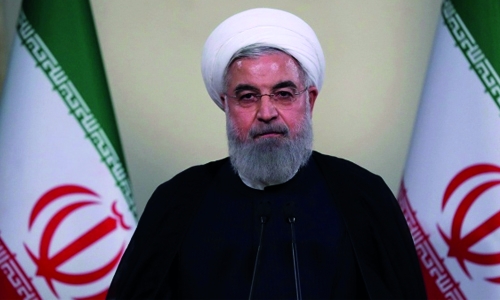Iran to turn to EU, Russia, China to remain in N-deal
Istanbul : Iranian President Hassan Rouhani said he has directed his diplomats to negotiate with European countries, Russia and China about remaining in the nuclear deal despite the U.S. withdrawal from the agreement.
But Rouhani said Iran is ready to start unlimited uranium enrichment if these negotiations do not yield benefits in a couple of weeks.
Iranian officials struck a defiant tone yesterday as President Trump withdrew the United States from a landmark nuclear deal with Tehran, a move that reimposes harsh economic sanctions and could prompt Iran to restart suspended nuclear activities.
The decision could trigger renewed U.S. sanctions on Iran’s oil sales and Central Bank, potentially disrupting Iran’s global financial transactions and putting further pressure on its already volatile economy. It also could put European allies in a bind over whether to continue the economic dealmaking they launched with Iran since the accord was implemented in early 2016. The allies have stood firmly behind the accord, which was negotiated between Iran and six world powers: the United States, Russia, China, Britain, France and Germany.
The allies could also suffer penalties under renewed U.S. sanctions, removing incentives to continue to invest in Iran.
In his speech, Trump also accused Iran of destabilizing the Middle East through its support of militant groups such as Lebanon’s Hezbollah, and he charged that Tehran seeks to build “nuclear-capable” ballistic missiles.
“If I allowed this deal to stand, there would soon be a nuclear arms race in the Middle East,” Trump asserted. “We cannot prevent an Iranian nuclear bomb under the decaying and rotten structure of the current agreement,” he added. “The Iran deal is defective at its core.”
As part of the nuclear deal, Iran pledged never to “seek, develop or acquire any nuclear weapons.” Iran’s supreme religious and political leader has declared nuclear weapons to be un-Islamic, saying that its nuclear program is aimed solely at producing energy and conducting medical research.
Iranian leaders said yesterday that the country would stand united in the face of any new sanctions or threats from the United States.
Iran “could face some problems” if Trump restores sanctions, Rouhani said at a petroleum conference in the capital, Tehran, before Trump announced his decision. “But we will move on.”
“If we are under sanctions or not, we should stand on our feet,” the Reuters news agency quoted him as saying.
Rouhani’s first vice president, Eshaq Jahangiri, said the government has “a plan for managing the country under any circumstances.”
In remarks reported by Iran’s Tasnim News Agency, Jahangiri, a popular reformist, said it would be “naive” to enter into negotiations with the United States again.
The comments underscored a growing debate among political factions in Iran over what to do if after the U.S. withdrawal. Some politicians have urged the government to continue to work with Europe to salvage the accord, which lifted key international sanctions in exchange for curbs on Iran’s nuclear program.
“If the Europeans are willing to give us sufficient guarantees, it makes sense for us to stay in the deal,” the deputy speaker of Iran’s parliament, Ali Motahari, said in remarks carried by the Iranian Students’ News Agency.
Motahari said Iran should wait several months to see whether Europe plans to resist U.S. pressure to disengage from the Iranian economy, where European companies have invested in sectors ranging from auto manufacturing to oil exploration and tourism.
If Europe succeeds, “this is a victory for Iran, because it will have created a gap between the United States and Europe,” he said.
But others have been less forgiving, urging Iran’s leaders to immediately withdraw and restart suspended elements of the country’s nuclear program if the United States left the deal. Fliers circulating online called for a rally in Iran’s northeastern city of Mashhad to “set the JCPOA on fire.” The nuclear deal is also known as the JCPOA, or Joint Comprehensive Plan of Action. The Iranian parliament’s Nuclear Committee published three actions that the government could take if Trump leaves the deal, including installing more centrifuges and enriching uranium beyond the levels allowed under the accord. Enriched uranium can be used as fuel for nuclear power plants or — if enriched at much higher levels — as fissile material for nuclear weapons.
(Washington Post)
Related Posts

